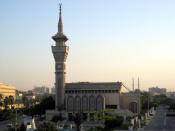Modern Egypt always has been a difficult country to govern. Physical control has been a relatively simple task, for the Egyptians are by nature a submissive people. But positive plans for development continually have been defeated by Egyptian inertia and lack of public responsibility. True, in the past, "strong men" --such as Mohamed Ali, dictator of Egypt for over forty years, and Khedive Ismail--have imposed their will on Egypt. When they passed from the stage, however, their accomplishments were dissipated by the ineptness of their successors and by the apathy of Egypt's ruling classes.
The nationalist revival during the period of British occupation revealed a public awareness among a segment of Cairo's population, but this seldom was transacted into positive achievements. Instead, the Egypt of 1952 was a stagnant country. Beset by political strife, successive national governments did little to foster the country's development. An archaic structure of land ownership, abysmal living conditions among the great majority of the population, an economy geared to benefit a privileged few, and political instability--this was the legacy after thirty years of independence (Frederick, 268).
The existing political parties abdicated their right to govern. In their struggle with the King and their quest for power and office, they treaded ruthlessly on the welfare of their country. Egypt's political structure blocked progress, rooted as it was in the status quo. No parliament controlled by wealthy landowners and Cairo's privileged social elite would support sweeping reform programs to the detriment of the vested interests.
Few groups were untainted by the corruption which permeated Cairo. Many ranking civil servants owed their positions to partisan politics; landowners gained protection from the Wafd; businessmen were dependent upon the government for favors; and high ranking military officers often owed their posts to the King's personal support. Only the middle-class military--the...



Opinion
Well what I have read is a good piece of work with elaborating each and every part of Egypt which is needed to be discussed as it is history and literature. The author knows what to write in a short paper and know what to discuss.
6 out of 7 people found this comment useful.